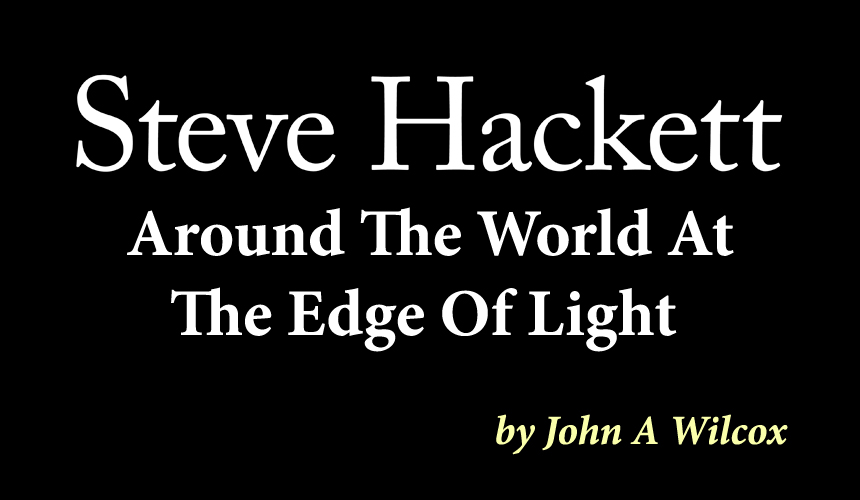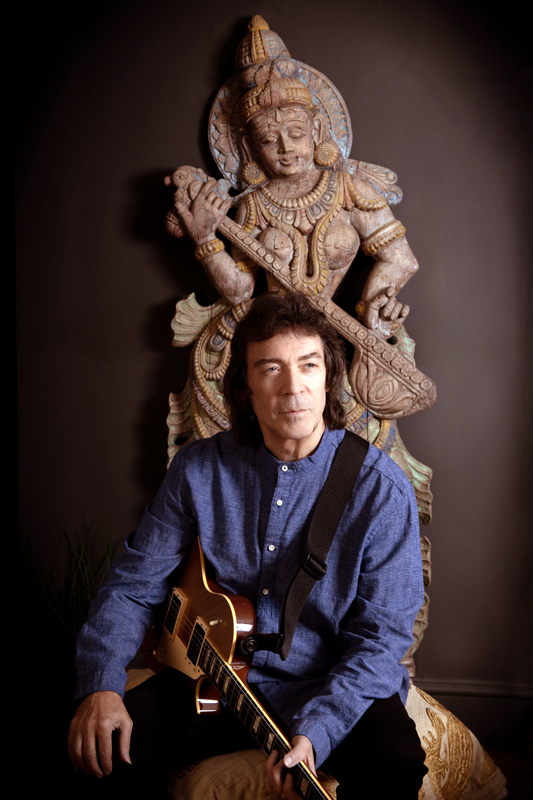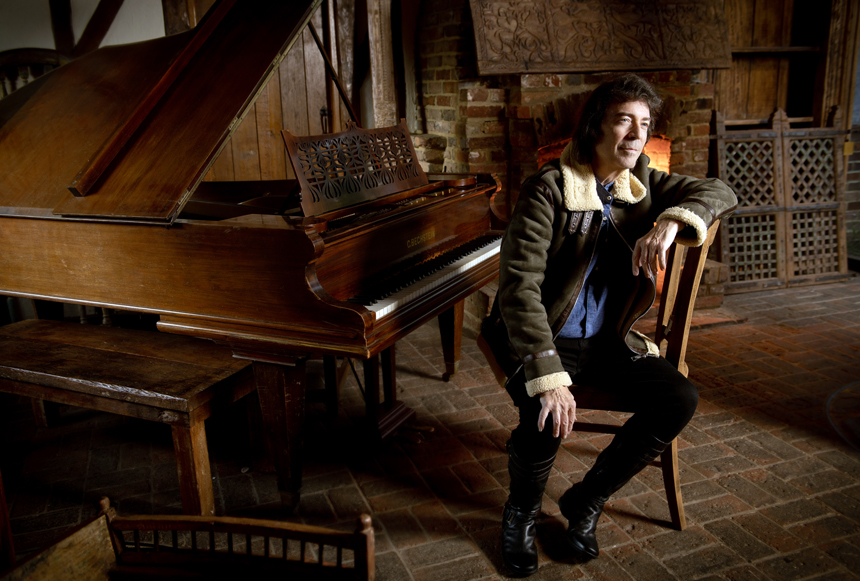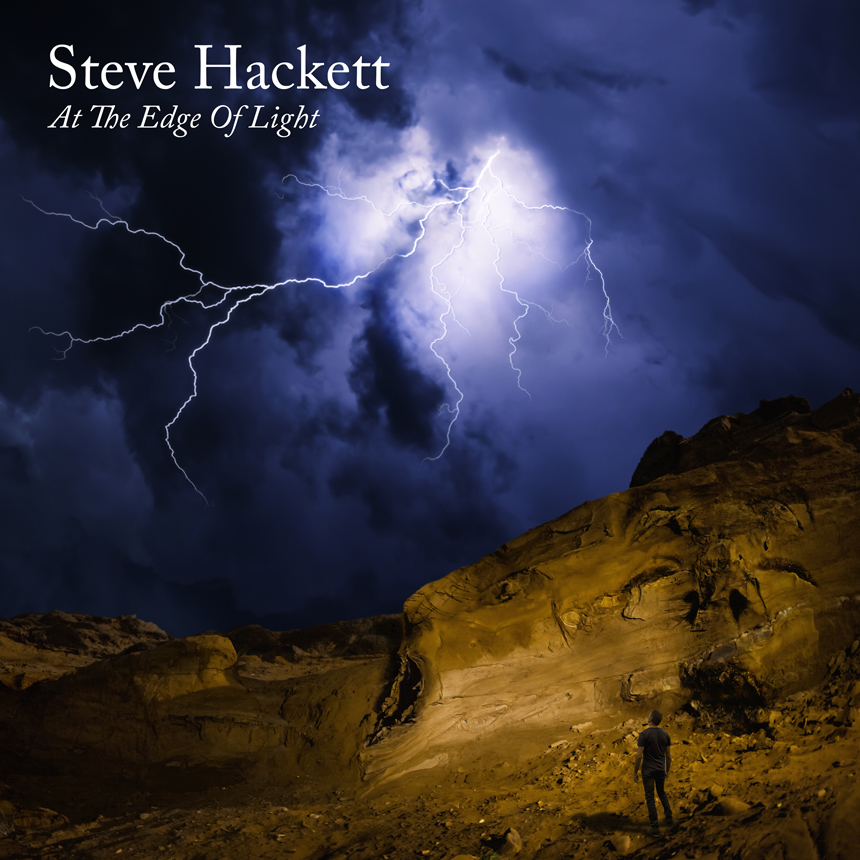Steve Hackett: Around The World At The Edge Of Light

by John A. Wilcox
The 1 constant in my many conversations with Steve Hackett is that there are no constants! Our conversations flow wherever they flow. This time the main subject was his exceptional new release: At The Edge Of Light. We discussed a few songs, but within that, so very much more! Join us...

PS: A very adventurous album, I must say.
SH: Yeah, it is. Very happy with it. Very pleased with it. Now I've lived with it a while so it seems like an old friend. I've lived through the honeymoon period of it and I'm through to the other side. There's a time when you listen to an album and you think I see no wrong. I hear no blemishes. I've been through the other side of that as well. Here I am now, already moving on. Bonus tracks for the Japanese and all that kind of stuff. I've been working very quickly on other peoples stuff as well. Quite a few events since then.
PS: What about this album could you not have done, say, 10 years ago?
SH: Well I think the technology perhaps wasn't there to do some of the stuff that we've done on this. The difference between performance and sample - those things break down quite a lot with modern recording, I find. Because you're kind of cannibalizing yourself all the time, but it's still a wonderful adventure. I can't tell you exactly what you couldn't do. Probably tons of it. But I think that the main change is in the machine called "me." That moves on, so the parameters get wider and it gets more ambitious as you move on. There's certain things vocally that I wouldn't have been able to do some years ago. Wearing my singer's hat, there are various things that I wanted to do. To work with different vocal styles and different vocal groups. Regular harmonies and gospel influence and country blues influence and then some chorale influence. Probably a whole bunch of things as well. The vocals are, for me, extremely ambitious without pushing anything. I'm not singing any of those vocals with a hard edge at all. I'm not letting rip, so I'm crooning through it all.
PS: A perfect spot to talk about Underground Railroad. What was the impetus for this one?
SH: Sure thing. It's the book called Underground Railroad, which had Obama's seal of approval. And Oprah Winfrey. They both gave it a glowing report. Although it's fiction, it's really faction. I was intrigued to read that. I bought it while I was on tour. It's turned into a song. I think it's a great book. I'm sure it will become a great film down the line, if not already. So I'm ready for hire - weddings, Bar Mitzvahs, and film soundtracks. I imagine it'll probably tell more of the story.than many soundtracks would do. I think in a sense the piece was a film for the ear. It's narrative. It's telling a story. And it gives me a chance to do some down home stuff. The McBroom sisters are on that. Durga and Lorelei McBroom who have worked with Pink Floyd - I think the past 4 albums or 4 live tours that Floyd did. I got to work with them a little bit live with Dave Kerzner and I liked the sound of them very much. There's a certain degree of authenticity that they bring to the whole thing. They seemed to be intrigued with the story as well. I gave them the book on the same day we were working on it. I think they turned in an extraordinary performance, a very authentic performance on it.
PS: What stringed instruments were you playing on that?
SH: I was playing a dobro with slide and regular. Usually it's 2 guitars. I'm playing a Les Paul, but I'm also playing a Fernandes.
PS: Is that the sustainy one?
SH: Yeah, that's right, with the sustaining facilities. It's got an upper harmonic that's always accessible with that instrument. So I mix it between that and the Les Paul. Most people think that I play the Les Paul all the time. Funnily enough, just recently I had been playing almost exclusively the Les Paul. It's a close call at times. There are certain things that one thing will do and certain things the other thing will do. If I can't find the note with 1, I switch to the other.
PS: If you have this palette available to you, why not use it?
SH: I owe no allegiance to any 1 thing. They're all magical guitars and I love them dearly. It's thrilling to work with all of them and they're always surprising me. Just when I think I know what it's gonna do, suddenly the guitar's got a life of its own. It starts morphing in your hands . Hopefully not all of it will be predictable. I don't want to be a predictable player. I want it to do surprising notes. That's what happens. Sometimes those notes travel through turns as I sustain them and they do rather extraordinary things. They take off like space ships.

PS: Under The Eye Of The Sun keeps taking left turns from where you expect it to go.
SH: The idea of doing something that was primal and basically talking about the Earth and the forms that are natural but seem to be supernatural. That's what's really promoted the lyrics; the inspiration. Many places that I visited in recent years where the rocks are red and the shapes look sculpted. It might be Uluru in Australia. It might be Monument Valley in the States. It might be Sedona. It could be Jordan where I've just visited and had an incredible experience. Visiting Petra and many other places. Jerash - also known at one time as Antioch. One version of Antioch. It's extraordinary - some of the stuff that you see. So really, it's a kind of paean to nature. The track indeed keeps morphing and it uses didgeridoo, or yidaki as the Australians call it. We used Armenian duduk as well as the electronic instruments. Flute. Icelandic drumming from Gulli Briem. Swedish bass playing from Jonas Reingold. British singing from myself and Amanda Lehmann.
PS: Quite propulsive rhythms in the main sections!
SH: Yeah. It is propulsive. Most of that rhythm is based on 1 acoustic guitar. But processed so that it's producing an octave above its natural placing. It's really that that drives the track. A fast strummed acoustic. And written, really, on a strummed thing. So it would be possible to do a busker's version of it. Just 1 acoustic guitar and 1 vocalist. But somehow I think that the wall of harmonies and everything else is what makes it work.
PS: Speaking of harmonies, let's talk about Hungry Years - a genuine pop song.
SH: A total pop song. Probably owing as much to folk music as anything else. I think that people don't do harmonies like they used to. The great harmony bands seem to have gotten left behind. I'm thinking of the sixties bands and then the Eagles were about the last really great harmony band that I heard. Although I know there are more and that's a very sweeping statement. But I think in terms of a band becoming incredibly well known internationally and transcending those national roots.
I think it's time to own up and say what a fan I was of Peter, Paul & Mary, frankly. Great voices. I think because it goes back to such an early time, I don't think I've heard a rock 'n' roller say that they really loved what they did. But let me be the first to say so. Perfect harmonies and great dynamics. Great songs, of course. I realize the goalposts have moved so many times since then. So much of that pre-dates rock as we know it. So many movements. Whether it's that or prog. But just to do an honest love song. I don't mind doing a love song. Relentlessly 4/4. I had great joy doing that tune.
PS: It shows.
SH: I wanted it to be a little bit like that. A little bit like the Byrds. With the use of guitars and chime-y instruments - although most of them are acoustic - it's mixed with electric things as well. There's a bit of electric 12 string in there with some keyboards. It all chimes away and there aren't any thick textures in there at all.
PS: A sunshiny tune.
SH: Yeah, exactly. Just dead simple. The kind of stuff that I know that when I worked with Chris Squire - although he was an absolute master of unusual timing - he did like tunes that were quite simple, with harmonies as well. I think that when it came to harmony moments and things being sunny, you've gotta let the note hang there. You've gotta let it fly. You don't want to kill it stone dead with too many uneven time signatures. You've got to let the air out of the lungs.
PS: As I get older, I find that what I look for most in music is honesty.
SH: I think honesty is very good. Energy and honesty is good. Authenticity I think. I'd rather have that than originality because there is no such thing. Original music cannot be accessed. We can't do it. We just rearrange the pieces on the board so to speak. It's a case of wherever you got interested in music perhaps. Whatever stage it was, whether you were very young, or it was in your teens. Maybe it was before that. I certainly remember being aware of music from the age of 2 years old onwards and trying to make music. And being bowled over by things. Usually a singer like Mario Lanza. It was the power of the voice every time. Just something that makes the walls ring.
PS: When I hear you have a new studio album, I tend to expect an audio diary of what you've experienced since the previous album.
SH: I think that's a very astute assessment of it. And fantasy as well.

PS: I feel a lot of your world travels in Shadow And Flame.
SH: Yup. Yup. That trip to India. Both my experience of India and my wife Jo's experience of India - who'd visited much earlier than me. Her experience of Varanasi which I have yet to visit. The lyric is really based on that. But the feeling of the instrumentation that follows is very much the feeling of Mumbai and overcrowding and the incredible experience of just being in India. Being anywhere there. Being on the roads and also seeing the extraordinary things. Temples carved out of stone. Taking a monolith. You don't move it. You take a mountain and the mountain takes you. Those people sculpted extraordinary things a thousand years ago. A building. A herd of elephants in front of it. The Ellora temples and caves. Extraordinary. So all of that has an influence in as much as you can describe any of that musically. The bustling nature of the way India works, and the roads which take some getting used to. The idea of every time you take a journey, there's a fatalistic aspect that kicks in. You're close to death the whole time. Trucks that come round the corner hurtling straight at you, and then somehow they miss. Most of the time. They seem to have an inability to slow down but swerve. The art of the swerve seems to be perfected there. But we did see some death while we were there as well.
PS: When you go to a place like India for the very first time, what aspects of it do you find to be the most alien to you?
SH: I think it's that fatalistic aspect. That's the hardest thing to get used to. Logic seems to play less a part than the idea of destiny. They're great believers in that it's all very much If God wills for the Arabs, Insha'Allah. It's the same kind of thinking at the end of the day. The idea that when your time's up, your time's up. There's a kind of lack of fear, which is very strange for us to get used to. We put up all these insurances. We protect ourselves and it seems they don't. The whole family go in the same vehicle. The same little bike. No one wears crash helmets and why would you? It's a different relationship to life. That takes some getting used to and I think if you're from somewhere else you never do get used to that. But the beauty of it gets through to you as well. The culture. The music. The food. The people. The spices. The smells. The sounds. The weather. It's an extraordinary place.
###
Table Of Contents
Contact




